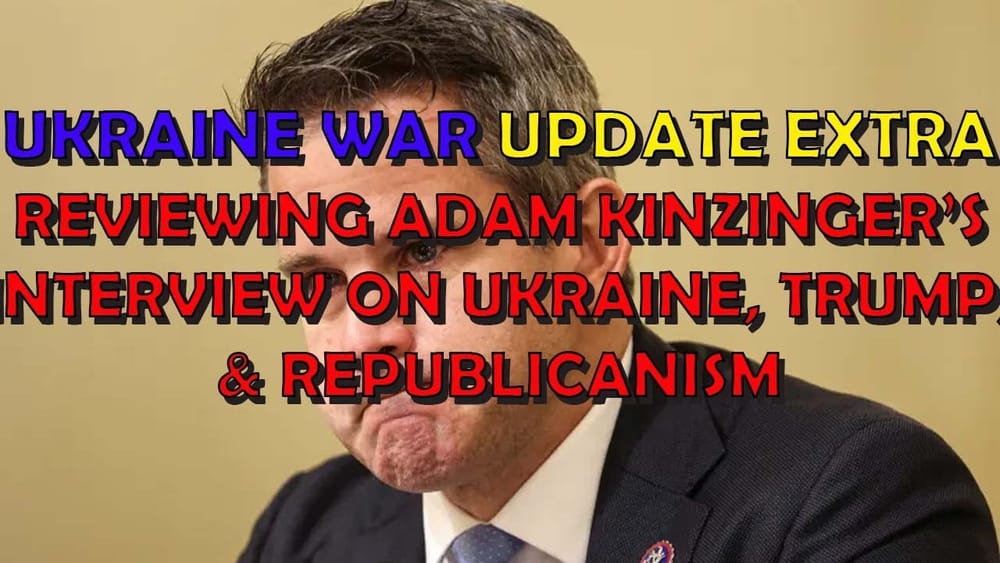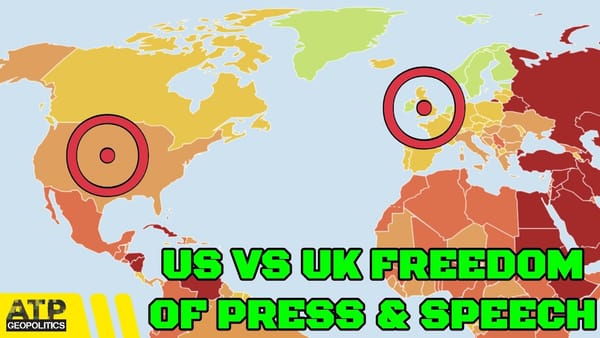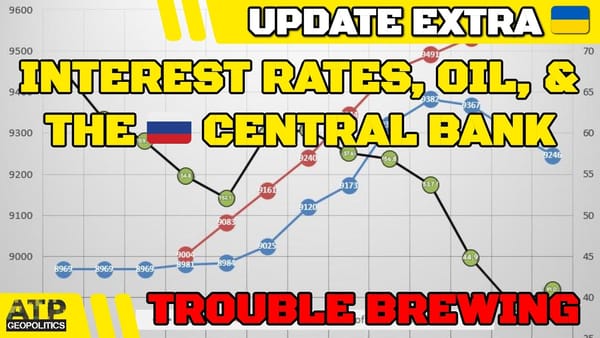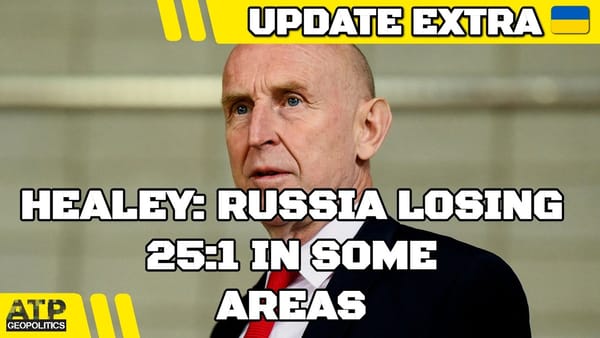Ukraine War Upd. EXTRA: Adam Kinzinger on Ukraine, Aid, Trump, & Republicanism
Table of Contents 📖
"The more Joe Biden talks up Ukraine, the more partisan it becomes and the more people, more Republicans will associate Ukraine with Biden, so I actually disagree with Kinzinger. I think that that he's almost, he's got to pick and choose when he talks about Ukraine. That's so sad that you have to be so calculated and how you talk about what should be one of the biggest stories and biggest policy areas into, certainly internationally, that that you need to talk about. And yet the more he talks about it, the more it becomes a Biden thing and the more he sings appraisers of support to Ukraine, the more it becomes a Biden thing."
Hello Team
🎦 00:00-00:21⏩
Jonathan welcomes viewers to another ATP Geopolitics Extra video. He notes this video will focus on US politics regarding Adam Kinzinger and includes an interview from The Daily Telegraph podcast "Ukraine: The Latest." He's a dedicated listener of this podcast, highly recommending it.
Return to top⤴️
Lankford Censured by Oklahoma GOP
🎦 00:21-04:49⏩
Before diving into the Adam Kinzinger interview, Jonathan discusses the Oklahoma GOP's censure of Senator James Lankford. He expresses disappointment that Lankford is being punished for working on a bipartisan border bill. Jonathan argues that compromise is necessary in a divided government, particularly when the opposing party controls the Presidency and one of the Congressional chambers. Jonathan highlights Lankford's efforts to significantly increase border security and criticises the Oklahoma GOP for prioritizing partisan politics over effective governance. This leads into Jonathan introducing Adam Kinzinger, a former Republican congressman, and the interview from the Daily Telegraph.
Return to top⤴️
Adam Kinzinger Interview - US Political Landscape
🎦 04:49-09:14⏩
Jonathan plays an excerpt from the Daily Telegraph podcast where Adam Kinzinger expresses concern about the state of US politics and the potential for a Biden-Trump rematch. Kinzinger notes that while the US economy is strong, a "culture war" has permeated politics, leading to partisan division even on issues like supporting Ukraine. He argues that some Republicans oppose aid to Ukraine simply because Biden supports it, highlighting the absurdity of making foreign policy a partisan issue. Kinzinger estimates that only 25% of Republicans genuinely support Ukraine, 25% are against, and 50% are indifferent or uninformed.
Return to top⤴️
ATP Commentary: Republican Support for Ukraine
🎦 09:14-11:25⏩
Jonathan pauses the interview to comment on Kinzinger's claim that most Republicans support Ukraine. While acknowledging that many Republicans, especially those outside the "MAGA" faction, do support Ukraine, Jonathan highlights the selection bias in Kinzinger's anecdotal evidence, as individuals attending his events are unlikely to be strong MAGA supporters who oppose Ukraine aid. He observes that there's a significant portion of Republicans, influenced by figures like Marjorie Taylor Greene, who are staunchly against supporting Ukraine. Jonathan invites viewers to share their perspectives on the prevalence of pro-Ukraine sentiment among Republican voters.
Return to top⤴️
Adam Kinzinger Interview - The Need for Presidential Leadership on Ukraine
🎦 11:25-18:23⏩
Jonathan continues the interview. Kinzinger argues that Biden should be more vocal in his support for Ukraine, not to persuade Democrats, but to articulate a clear vision and rally public support, as many misunderstand the nature of US aid. He emphasizes that most aid is spent domestically, bolstering US defense production. Jonathan initially agrees that Biden should communicate the benefits of assisting Ukraine more effectively, but expresses concern that this might backfire, further polarizing the issue. Jonathan acknowledges that while the public should not dictate foreign policy, leaders need to guide and prepare the nation, drawing parallels to historical examples of mobilizing for war. Jonathan agrees with Kinzinger that Biden should emphasize the effectiveness of US aid, highlighting statistics demonstrating Ukraine's success in inflicting heavy losses on Russia at a fraction of the cost borne by the US in Afghanistan. Jonathan contemplates whether a media outlet like Fox News taking a firm pro-Ukraine stance could sway Republican voters, but ultimately doubts it, as Murdoch's media empire thrives on "anger-tainment" rather than truth.
Return to top⤴️
ATP Commentary: Ingroups, Outgroups, and the Power of the Messenger
🎦 18:23-20:05⏩
Jonathan pauses the interview again to delve into the psychology behind Kinzinger's argument. He explains that people are more receptive to messages from those within their "in-group" - people they identify with politically, religiously, or culturally. Conversely, messages from "out-groups" often trigger a "backfire effect," entrenching individuals in their existing beliefs, even when presented with contradictory evidence. He highlights the challenge of persuading those deeply entrenched in a particular ideology, even within the same political party. Jonathan posits that an influential figure outside traditional politics, like Elon Musk, could potentially sway public opinion on Ukraine if he were to advocate for support. He notes that the messenger is often more important than the message itself.
Return to top⤴️
Adam Kinzinger Interview: Republican Cowardice and How To Get Ukraine Aid Passed
🎦 20:05-23:03⏩
Resuming the interview, Kinzinger claims that most of his Republican colleagues in Congress privately support Ukraine but fear backlash from their base or Trump. Jonathan highlights the significance of this statement - that many Republican politicians are aware of the right course of action but lack the courage to stand up for it, fearing repercussions from their constituents or Trump. He asserts that this fear is pervasive and deeply troubling for the future of US democracy. Jonathan praises Kinzinger for emphasizing that representatives rarely have the opportunity to make a global impact, encouraging them to seize this moment. Jonathan further extrapolates from Kinzinger's suggestion that a small group of representatives could force a vote on Ukraine aid by refusing to pass any other legislation until it's brought to the floor. While acknowledging this is theoretically possible, Jonathan points out that these representatives would likely face severe backlash from the most extreme elements of their base, making it a risky strategy.
Return to top⤴️
Adam Kinzinger Interview: Making the Case For Ukraine to the American People
🎦 23:03-28:57⏩
The interview continues. Kinzinger stresses that while direct military involvement might not be necessary, the US, along with its allies, must demonstrate unwavering support to deter further Russian aggression against NATO members. Jonathan interjects, stating that Poland and the UK alone could likely defeat Russia conventionally, underscoring the depletion of Russian military capability in Ukraine. Jonathan then notes how Turnbull, a conservative prime minister, took a firm stance against the influence of Murdoch's media empire in Australia. Kinzinger argues that the most effective way to persuade the American public is to appeal to their sense of global responsibility, reminding them of the role US ideals played in the fall of the Iron Curtain. He also suggests emphasizing the cost-effectiveness of aiding Ukraine, highlighting the staggering losses Russia has endured compared to the relatively modest US investment. Shifting back to Trump, Kinzinger believes that while not impossible, it would be challenging to persuade him to change his stance on Ukraine. However, he suggests appealing to Trump's narcissism by highlighting the reputational damage he would suffer if Ukraine were to fall on his watch. Jonathan seizes on this point, arguing that appealing to Trump's ego and desire for a legacy might be the most effective way to secure his support for Ukraine.
Return to top⤴️
Adam Kinzinger Interview: Afghanistan, Biden's Approval Rating, and the Importance of Perception
🎦 28:57-32:13⏩
Kinzinger expresses concern that Biden's approval rating, which plummeted after the withdrawal from Afghanistan, could suffer a similar fate if Ukraine were to fall, emphasizing the importance of public perception. He cautions that while the chaotic withdrawal from Afghanistan might not have been inherently wrong, it violated Americans' self-image as a steadfast and reliable ally, shaking their confidence in Biden's leadership. Jonathan agrees, noting that events like Afghanistan, while not solely about foreign policy, contribute significantly to how the electorate perceives a leader's competence.
Return to top⤴️
Adam Kinzinger Interview: Think Tanks, Fear Mongering, and the Power of Conservative Media
🎦 32:13-40:34⏩
Kinzinger highlights the concerning trend of conservative think tanks prioritizing fundraising over genuine policy development. He points to the Heritage Foundation as an example of this, claiming it has become a mouthpiece for extremist views, peddling fear and division to attract funding. Jonathan draws parallels with the UK, where right-wing media outlets like the Daily Mail employ similar tactics, exploiting fear and negativity to drive readership. Kinzinger argues that this focus on fear, while effective for short-term political gain, ultimately creates a toxic and unsustainable political environment. Jonathan expands on this, pointing out that conservative groups often benefit from keeping issues like immigration unresolved, as it allows them to stoke fear and mobilize voters based on those fears. He suggests that the Republican Party either needs to experience a series of electoral defeats to force a fundamental re-evaluation of its approach or a new conservative movement, divorced from the fear-mongering and extremism that currently define the GOP, needs to emerge.
Return to top⤴️
ATP Commentary: The Heritage Foundation, Viktor Orban, and Russian Influence
🎦 32:28-34:40⏩
Jonathan pauses the interview to interject about the Heritage Foundation, mentioning his own article on the subject. He exposes what he calls a network of influence flowing from the Kremlin, through Hungarian Prime Minister Viktor Orban, and into US conservative circles, including the Heritage Foundation. He claims that Orban, financially backed by Russia, funnels money to organizations like Heritage to promote pro-Russian and authoritarian-leaning agendas within the US. He finds it telling that the Conservative Political Action Conference (CPAC) has been held multiple times in Budapest, further highlighting the growing ties between Orban's government and the US right.
Return to top⤴️
Adam Kinzinger Interview: The US Media Landscape and the Challenges of Covering Trump
🎦 40:34-48:45⏩
The interview continues with a discussion about the US media. Kinzinger expresses concern about the state of US media, particularly regarding foreign policy coverage, arguing that it has become increasingly polarized and driven by sensationalism rather than a commitment to truth. He contrasts this with the UK media landscape, which he believes maintains a greater degree of responsibility and accountability, even when presenting differing viewpoints. Kinzinger acknowledges that while a diversity of media sources is generally positive, the current US media environment incentivizes extremism and competition for viewers, often at the expense of accuracy and journalistic integrity. He highlights the importance of legal accountability in reining in outlets like Fox News, which he accuses of knowingly spreading disinformation, particularly regarding the 2020 election. He believes that lawsuits, while not a perfect solution, are necessary to establish guardrails and deter malicious actors. Jonathan interjects, agreeing with Kinzinger's assessment and drawing parallels between the US media and the rise of populist leaders like Trump, whose rhetoric often aligns with and is amplified by sensationalist media outlets. He emphasizes that breaking free from these echo chambers requires a conscious effort to consume information from a variety of sources and engage with differing viewpoints critically.
Return to top⤴️
Adam Kinzinger Interview: European Self-Reliance and the Future of NATO
🎦 48:45-50:53⏩
In the final section of the interview, Kinzinger addresses the question of whether the US would abandon NATO under a Trump presidency. While acknowledging that Trump has expressed disdain for NATO in the past, he doubts that he would actually withdraw, as such a move would likely be blocked by Congress and the Senate. However, he cautions that Trump's rhetoric alone is damaging to the alliance and could embolden adversaries like Putin. He encourages European nations to continue strengthening their defense capabilities, not because the US is unreliable but because self-reliance is inherently valuable and provides a necessary insurance policy. Kinzinger expresses optimism that the US will remain a committed partner to Europe, regardless of who occupies the White House.
Return to top⤴️
Wrap Up
🎦 50:53-53:23⏩
Jonathan concludes the video by acknowledging that Kinzinger is a divisive figure in American politics and some viewers might disagree with his perspectives. He encourages viewers to be open to hearing diverse viewpoints and engaging with challenging ideas, emphasizing the importance of critical thinking and avoiding intellectual isolation within echo chambers. He encourages viewers to share their own thoughts and opinions in the comments section and reminds them to like, subscribe, and share the video.
Return to top⤴️




